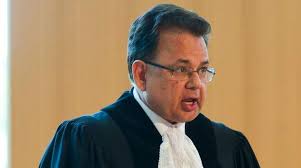Dalveer Bhandari re-elected to International Court of Justice
India’s nominee to International Court of Justice (ICJ) Dalveer Bhandari (70) was re-elected to fifth and the last seat of world court. Bhandari received 183-193 votes in United Nations General Assembly and secured all 15 votes in UN Security Council (UNSC).
He was elected after Britain withdrew its candidate from the election. This is the first time since the ICJ was established in 1945 that there will be no British judge in ICJ. Bhandari is fourth Indian judge to be elected to ICJ after B.N. Rau, Nagendra Singh and RS Pathak.
Who is Dalveer Bhandari?
Justice Bhandari was born on October 1, 1947. He comes from a family of lawyers. He had studied humanities and law from Jodhpur University and practiced law at Rajasthan High Court between 1968 and 1970.
After successful career of 23 years as practising lawyer, he was appointed judge in Delhi High Court in 1991. He was then appointed Chief Justice of Bombay High Court. In October 2005, he was elevated to Supreme Court as judge.
After an illustrious term at apex court of India, he was sworn in as member of ICJ in June 2012. In 2014, He was conferred with Padma Bhushan, the third highest civilian award in India. Bhandari has served as an Executive Member of International Law Association, India Chapter, since 1994. He was also elected President of India International Law Foundation in 2007 and holds position still.
International Court of Justice (ICJ)
ICJ is principal judicial body of UN. It was established in 1945 via UN Charter and its jurisdiction is worldwide. It is located in “The Hague” in Netherlands and has 193 state parties. Current President is Ronny Abraham.
The major functions of ICJ are to settle legal disputes submitted to it by states and to provide advisory opinions on legal questions submitted to it by duly authorized international organs, agencies, and UN General Assembly.
ICJ is composed of 15 judges elected to nine-year terms of office by UNGA and UN Security Council. These organs vote simultaneously but separately. In order to be elected, a candidate must receive absolute majority of votes in both bodies. In order to ensure measure of continuity, one third of ICJ is elected every three years. Judges are eligible for re-election. President and Vice-President are also elected by the court, but for three-year periods
Month: Current Affairs - November, 2017



Prince dwivedi
November 22, 2017 at 6:13 amIt is such a great thing to us that mr. Bhandari maked us proud again.
Prince dwivedi
November 22, 2017 at 6:13 amIt is such a great thing to us that mr. Bhandari maked us proud again.
Dr.Cajetan Coelho
December 3, 2017 at 7:27 pmAll the best to Dalveer Bhandari.
Dr.Cajetan Coelho
December 3, 2017 at 7:27 pmAll the best to Dalveer Bhandari.